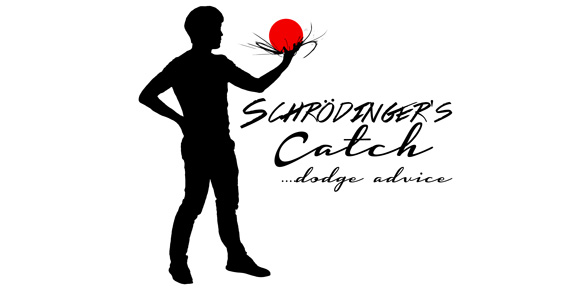Schrödinger’s Catch #2
Posted on October 02, 2013 at 10:10 pm |
You folks submitted some awesome responses to my column last week, and yours truly couldn’t be happier! Here’s the next installment you’ve been waiting for, and keep those questions coming! I promise I will only dodge balls not issues.
Let’s get to the questions!
When is it worth letting your ball go “dead” instead of resetting?
— Bunson Burner
Thanks for submitting such a burning question, Bunson.
First things first, dead balls are terrible. They’re just another means of eliminating yourself, whether you are throwing a dead ball, blocking with a dead ball, or catching with a dead ball in your possession.
Resetting is a (controversial) technique/strategy which has evolved in our game to maintain control of the balls and the court; a player will reset a ball’s count by rebounding the ball against the opposing team’s back wall.
It is worth letting a ball die in some situations. Basically, you want to ask yourself: “What might net my team more balls and/or increase my team’s chances of success?” If, like in the following case, surrendering the ball would do the trick, then listen to your inner guru and hold the ball till death do you part.
Holding the line to push back or threaten the other team with your decaying IDA regulation Swedish foam rocket is a strategy you can use so that your team collects balls which are literally on the fence with increased safety.
There are plenty of other situations which can be dreamed up, but really it comes down to maximizing your control of the court.
Please note that the rules of dodgeball are written with the motivation and intent to keep the game fast paced — by the same token, while your friendly league coordinators love seeing tense and exciting dodgeball matches, they also like going home and sleeping. Games without countdowns would require attacks or horribly off-balanced people who step over sidelines to run through to completion.
XOXO Dodge Savage
I often see players get hit, but do not take themselves out of the game. Is there any way to standardize refs to help alleviate this issue?
— Yao Bling
Yao Bling,
Spirit is important in our game; it’s how you turn fierce opponents into future team recruits and more importantly it’s how you maximize on fun! One part of spirit which you’re addressing is honesty — It’s a huge part of the game, and as the rhyme goes: “when in doubt, you are out”.
Sometimes players don’t notice themselves getting hit, and I understand this can get frustrating for you. It is important to give them the benefit of the doubt just as you would be provided that same benefit. Then there are things that the refs don’t see sometimes like sidelines, and even plays that players aren’t calling themselves out on, like when a ball hits their decorative cape or a deflection. There are also probably ways of standardizing reffing which the league could pursue, or even opportunities to employ advanced computer vision techniques or an ensorceled court or set of balls.
The best thing you can do to address these issues is to be a good ref yourself, which means a few obvious things:
- Ref loudly when you are counting balls, announcing game start, and making your calls.
- Make the RIGHT call. Be assertive – this doesn’t mean that you are never wrong. You are only human but stick to your call in the game OR stop the game to clarify a call with the other refs (if you disagree with them) to come to a unanimous group consensus.
These are all things you can do, but something tells me you are already employing these stratagems and those listed on VDL’s officiating guidelines.
I think what is more paramount is the inclusion of all players on your team and other teams to be enthusiastic refs who step up to the reffing challenge. This will improve the overall quality of reffing and the pace of the game. Not only that but as players on the court you will improve; the reffing (un)fortunately varies between tiers and they are directly proportional. Please note that side reffing doesn’t help; if you have a problem with the refs or a team, bring it up with their captain when they aren’t playing.
Hugs and kisses,
Dodge Savage
Dear Dodge Savage, on many occasions I am the last player remaining against about 3 others and my catching could use some work. What is the best option that I can do (besides practice my catching!) to help my team win?
— what do
Dear Mr. or Ms. Do,
First off, I would like to say:
Catches are great and hard, and I’m sure you’ve seen games that have been won both with and without catches. Let’s understand why catching is such a powerful changing mechanism.
Here is what makes catches awesomely powerful in order of splendor and majesty:
- A player is eliminated from the opposing team
- If you didn’t just win the game, you now have a ball
- You may have gained a player on your side
You say “What? Gaining a player is at the bottom of the list?”
Gaining a player is a nice bonus, but it is the least important contribution in this writer’s (often catchless) opinion. Ball possession is the second most important thing in dodgeball…the most important thing is spirit. If you have balls you have offensive and defensive options; if you have no balls, you have no options.
What can you do to help your team? Retain as many balls as possible so that if and when it does come down to you, and you’re alone, you have the options to play to your strengths and your style of play, whatever that may be.
Empoweringly yours,
Dodge Savage
Have a burning dodgeball question you need answered? Submit your question in the comments below!





